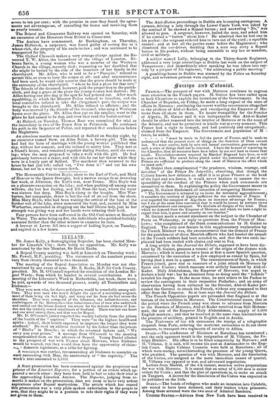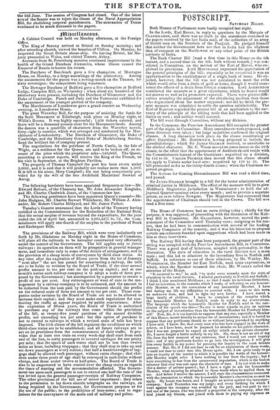ffortiqn anti OSolonial.
FRANCE.—The prospect of war with Morocco continues to engross most attention in the French papers. M. Guizot has been called upon in both Chambers to explain the intentions of the Government. In the Chamber of Deputies, on Friday, he made a long exposé of the state of affairs in Morocco ; attributing the recent warlike occurrences altogether to the artifices of Abd-el-Kader, and exculpating the Emperor of Mo- rocco from all share in them. To insure tranquillity for the frontier of Algeria, M. Guizot said it was indispensable that Abd-el-Kader should be either removed into the interior of Morocco or to the coast of the Atlantic, and not be permitted to kindle war at every moment. This France had a right to demand, and had positively and categorically claimed from the Emperor. The Government and population of Di - rocco, he added, - - - - " must be made to feel the power of France, and be made to understand that the present state of things on the frontiers of Oran cannot. last. We must receive, both by acts and formal conventions, guarantees that such a state of things shall not be renewed. I have the honour of repeating to the Chamber, that all measures have been taken by sea and land to insure that result. The reinforcements required by Marshal Bugesud have been, or will be, sent to Lim. The naval forces placed under the command of one of our Princes are sufficient to produce along the coast of Morocco the effect which we must seek."
M. Guizot then complimented "the prudence, wisdom, courage, and devotion" of the Prince De Joinville; observing, that though the Cabinet knows how delicate an affair it is to place Princes at the head of the land and sea forces, it would never hesitate to assume the re- sponsibility of the conduct of the Princes when such commands are committed to them. In explaining the policy the Government meant to pursue, M. Guizot disclaimed all intention of conquering Morocco- " The Government is actuated by no desire for territorial aggrandizement;, it considers the territory of Algeria sufficient for the ambition of France. I ever regarded the conquest of Algeria as an immense advantage for France; but I am at the same time convinced that it would be insane to nurture views of aggrandizement and conquest. We disclaim all designs of the kind. That which we demand from the Emperor of Morocco, and which we have a right to expect from him, is peace and security on our frontier."
M. Guizot made a second statement on the subject in the Chamber of Peers on Wednesday, in reply to questions from the Prince of Mos- kowa ; who complained of the frank communications by M. Guizot to England. The only new feature in this supplementary explanation by the French Minister was, the announcement that the demand of France- for the punishment of those Moorish officers who had headed the assault on the French soldiers had been acceded to, and that the two caids im- plicated had been loaded with chains and sent to Fez.
A long article in the Journal des Debate, supposed to have been dic- tated by M. Guizot, presents a resume of the origin of the dispute with- Morocco ; which is stated to have been at first a mere Spanish question, occasioned by the execution of a Jew employed as consul by Spain, for having shot a man in a quarrel. The remonstrances of Spain, in which France joined, gave rise to rumours of a joint attack on Morocco by Spain and France ; which rumours were artfully fomented by Abd-el- Kader. Muly Abderahman, the Emperor of Morocco, was urged to declare a holy war ; but he abstained from so doing until the " Infidels " invaded his empire. In the mean time, he sent orders to his Pashas to review the contingents in their respective Pashalics ; and an army of observation having been collected on the frontier, Abd-el-Kader per- suaded the General to attack the French, without any command to that effect from the Emperor. So at least says the Journal des Debats. The French Opposition papers are persuaded that England is at the bottom of the hostilities in Morocco. The Constitutionnel states, that at the period when the French army was about to advance from Mascara to the frontiers of Morocco, A bd-el-Kader received from Sidi-Moham- med, the son of the Emperor Muly Abderabman, a supply of 6,000. English muskets ; and that he received at the same time instructions in the practice of artillery, printed in English and in Arabic. 'The Toulonnais of the 4th announces the receipt of a telegraphic. despatch from Paris, ordering the maritime authorities to fit out three steamers, to transport two regiments of cavalry to Africa. SPAIN.—The conference of Ministers at Barcelona has terminated ; and the only apparent result is the resignation of M. Villuma, the Fo- reign Minister. His office is to be filled temporarily by Narvaez ; and M. Villuma, it is said, will resume his post as Ambassador to the Eng- lish Court. Eight Cabinet Councils were held at Barcelona ; all of which were stormy, notwithstanding the presence of the young Queen, who presided. The question of war with Morocco, and the dissolution of the Cortes, are assigned as the more immediate causes of quarrel. M. Villuma was opposed to war, and advocated negotiation.
Letters from Madrid, of the 4th instant, mention active preparations for war with Morocco. It is stated that an army of 6,300 men is under orders for Ceuta ; and that the plan of operations is, to make an attack on Tangiers. A decree for the dissolution of the Cortes was expected to be published on the 10th.
ITALY.—The bands of refugees who made an incursion into Calabria, are stated to have been defeated, and their leaders taken prisoners. Among those arrested were the two sons of Admiral Bandeira.
UNITED Sreavi.—Advices from New York have been received to
the 22d Jane. The session of Congress bad closed. One of the latest sets of the Senate was to reject the clause of the Naval Appropriation Bill, for abolishing corporal punishments. The annexation of Texas continued to be much discussed in the papers.



























 Previous page
Previous page